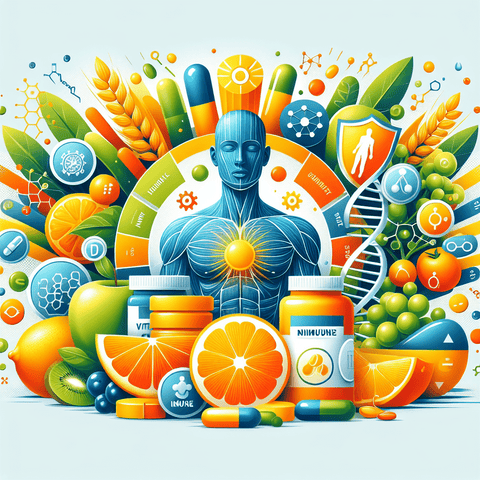Introduction: Understanding the Role and Benefits of Nutritional Supplements
In our fast-paced modern world, nutritional supplements have emerged as essential tools to support overall health and well-being. Whether to fill gaps in the daily diet, promote immune health, or optimize physical and cognitive performance, supplements can enhance the quality of life across every age group. They are not a replacement for a nutrient-rich diet but serve as complementary aids to meet individual nutritional needs, especially when those needs aren't sufficiently covered through food alone. With the increasing awareness of health and wellness, more people are turning to supplements as a key component of preventive healthcare. Aging populations, vegetarians, fitness enthusiasts, pregnant women, and individuals with chronic conditions are all discovering the value of targeted supplementation. Trends also suggest a rising interest in plant-based, scientifically backed, and ethically produced supplements. This comprehensive guide explores the best nutritional supplements available today, answering critical questions about what they are, how they work, who should use them, and which types are most effective. We’ll take a deep dive into major categories like vitamins, minerals, amino acids, plant-based options, and antioxidant aids. We'll also share expert tips on how to select safe, high-quality supplements that align with your lifestyle. Expect to leave with a better understanding of which supplements may benefit you and how to use them responsibly for optimal health outcomes.Nutritional Supplements: An Essential Piece of a Balanced Lifestyle
Nutritional supplements come in many forms—capsules, tablets, powders, and liquids—and include essential nutrients such as vitamins, minerals, amino acids, and herbal extracts. Unlike pharmaceuticals, which treat diseases, supplements serve to maintain or improve health and often act preventively. They help ensure the daily nutrient needs dictated by age, activity level, and health condition are met effectively. Responding to dietary gaps is one of the main reasons people incorporate supplements into their routines. For example, busy professionals may skip meals or consume primarily processed foods, while older adults may experience reduced absorption of specific nutrients like vitamin B12 or calcium. Meanwhile, athletes push their bodies to the limit and often require additional nutrients to support energy metabolism, muscle recovery, and joint health. For many, supplements such as omega-3 fatty acids, magnesium, or vitamin D address specific health concerns, such as cardiovascular health or bone density. Others may choose plant-based adaptogens to cope with everyday stress. What’s crucial to understand is that supplements are personalized and should be chosen based on individual needs determined through lifestyle assessments or nutritional testing. Before starting any new supplement, it’s imperative to consult a healthcare provider, particularly if you’re pregnant, nursing, managing chronic conditions, or taking medications. A medical professional can interpret blood tests to reveal nutrient deficiencies and guide you in creating a supplementation plan tailored to your physiological requirements. This ensures effectiveness, avoids unnecessary intake, and minimizes risks of interaction or excessive dosing. Supplements also work best when integrated into a holistic approach to wellness that includes a balanced diet, regular exercise, hydration, and stress management. They are not quick fixes but, when used correctly, are powerful allies in achieving long-term health goals.Vitamin Complexes: Boosting Overall Vitality and Immune Function
Vitamin complexes are among the most widely used nutritional supplements, designed to deliver a combination of essential vitamins in one formula. These can range from general multivitamins to specific complexes like vitamin B-complexes, or high-dose single vitamins such as vitamin C and vitamin D. Multivitamins contain a spectrum of water- and fat-soluble vitamins including A, C, D, E, and the array of B vitamins. These are integral to cellular function, immune system regulation, skin health, energy metabolism, and more. Despite balanced meals, various life stages or health conditions can lead to increased requirements. For instance, pregnant women need higher folic acid; aging adults may need extra vitamin D and B12. The B-complex vitamins (B1 through B12) are especially critical for cognitive function, red blood cell production, mood regulation, and energy generation. They often appeal to individuals experiencing fatigue, stress, or vegetarians who might lack sufficient intake from plant-based foods. Similarly, vitamin C plays a role in collagen synthesis and acts as an antioxidant, while vitamin D is vital for calcium absorption and immune support. If sun exposure is limited, as is common in colder climates, supplementation becomes a necessity. Visit our dedicated category page to explore top-tier vitamin D supplements for optimal immune and bone support. Among the demographic that stands to benefit significantly from vitamin supplements are pregnant women (prenatal vitamins), seniors (to combat age-related deficiencies), vegans and vegetarians (for B12 and D), and individuals under chronic stress or illness. However, overuse of vitamins—especially fat-soluble ones like A, D, E, and K—can lead to toxicity. Hence, dosing must adhere to established dietary reference values unless guided otherwise by a healthcare provider. Quality also matters: choose products that have transparent labeling, batch testing, and certifications from trusted sources. When sourced properly and paired with a nutrient-rich diet, vitamin complexes can work as foundational tools to maintain vitality, ward off deficiencies, and keep the immune system functioning optimally throughout the year.Mineral Supplements: Essential Elements for Optimal Body Function
Minerals are inorganic elements that the body needs in small quantities to execute a broad range of physiological processes. From nerve transmission and muscle contraction to bone development and immune modulation, minerals are the unsung heroes sustaining our internal balance. Some of the most important mineral supplements include magnesium, calcium, zinc, iron, and selenium. Magnesium supports over 300 biochemical reactions in the body, with roles in energy production, muscle function, and neurotransmission. Many people unknowingly suffer from suboptimal magnesium levels due to poor diet and chronic stress. Symptoms can include fatigue, muscle cramps, and anxiety. Our curated collection of magnesium supplements offers solutions tailored for energy, relaxation, and metabolic health. Calcium, the most abundant mineral in the body, is indispensable for maintaining bone integrity and muscle contractions. Particularly in post-menopausal women or those with reduced dairy intake, supplementary calcium may help mitigate bone density loss when combined with vitamin D and K. Zinc is another crucial mineral with roles in immune defense, wound healing, and hormonal regulation. Short-term zinc supplementation has shown benefits in reducing the duration of the common cold, particularly in lozenge formulations. Iron is primarily known for its role in hemoglobin formation and oxygen transport. It's especially important for menstruating women, pregnant individuals, and endurance athletes. However, unnecessary supplementation without confirmed deficiency may lead to oxidative stress or gastrointestinal distress. Selenium, although required only in trace amounts, has gained attention for its antioxidant properties and potential role in thyroid function. Found minimally in soil today, selenium supplements benefit those in deficient regions or with low dietary intake. Before starting any mineral supplement, testing is advisable, as both deficiencies and excesses can pose health risks. Likewise, the bioavailability of different forms matters—magnesium citrate, for example, is more absorbable than magnesium oxide. Acute awareness of life stage, health goals, and existing conditions boosts success when supplementing minerals effectively.Amino Acid Supplements: Supporting Muscle Growth, Recovery, and Brain Health
Amino acids are the building blocks of protein and serve as critical agents in muscle repair, neurotransmitter production, and metabolic balance. There are 20 amino acids, nine of which are essential (i.e., not produced by the body and must be obtained through diet or supplementation). Supplementing with specific amino acids can help individuals with diets low in protein, those in recovery, or athletes aiming to optimize physical performance. Branched-chain amino acids (BCAAs)—leucine, isoleucine, and valine—are among the most popular supplements for athletes and bodybuilders. They benefit muscle protein synthesis and help reduce exercise-induced muscle soreness. Evidence also suggests they may aid in preventing muscle breakdown during prolonged periods of fasting or intense training. Glutamine is another notable amino acid often used for muscle recovery and gut support. It plays a role in immune function and is the preferred fuel for intestinal cells, making it beneficial for individuals with compromised gastrointestinal health. L-arginine supports blood flow and cardiovascular function by producing nitric oxide, a compound that dilates blood vessels. It's also used in pre-workout formulas to improve oxygen and nutrient delivery to muscles during exercise. Amino acids like tryptophan, tyrosine, and phenylalanine serve crucial roles in mood regulation and cognitive performance as precursors to neurotransmitters such as serotonin and dopamine. For individuals struggling with mood imbalances, amino acids may provide complementary support under professional supervision. While generally safe, amino acid supplementation should be carefully dosed to avoid imbalances or digestive issues. High-quality products will specify amino acid concentrations and sourcing transparency. When used correctly, they provide potent tools to amplify athletic performance, improve endurance and energy, and support mental clarity.Plant-Based Supplements: Harnessing Nature for Holistic Wellness
Plant-based supplements extract the nutritional and therapeutic benefits of botanicals to address a variety of health concerns—from inflammation and fatigue to immune modulation and stress. They appeal to those seeking natural alternatives and align seamlessly with plant-forward diets like veganism or flexitarianism. Turmeric, rich in the bioactive compound curcumin, possesses well-known anti-inflammatory and antioxidant properties. It’s widely used to manage joint discomfort and support cardiovascular and cognitive health. When paired with black pepper (piperine), its bioavailability improves significantly. Ashwagandha and ginseng are adaptogens—herbs that help the body resist physical, environmental, and emotional stress. Ashwagandha has been studied for its calming effects on cortisol levels, while ginseng is often used to increase energy, focus, and immune health. Spirulina, a blue-green algae, is a nutrient-dense superfood packed with protein, vitamins, and minerals such as iron and B12, making it a great staple in vegan diets. It also contains antioxidants such as phycocyanin, which support cellular detoxification. Echinacea is utilized primarily for immune support and has been shown in some studies to reduce the severity of common respiratory infections. Likewise, green tea extract, rich in polyphenols like EGCG, provides antioxidant and anti-inflammatory benefits. When selecting plant-based supplements, it’s essential to prioritize clinical standardization and third-party testing. Natural does not always mean safe—dosing, sourcing practices, and purity matter. Integrating these supplements into a plant-centric lifestyle can be both impactful and sustainable, helping bridge the gap between traditional herbal wisdom and modern science.Dietary Antioxidant Aids: Defending Your Cells Against Oxidative Stress
Antioxidants are compounds that neutralize free radicals—unstable molecules generated through normal metabolic processes and environmental exposures like UV light, pollution, and poor diet. If unchecked, oxidative stress can lead to cellular damage, aging, and mitochondrial inefficiency. Antioxidant supplements bolster the body's natural defenses and are particularly helpful in brain function, heart health, and immunity. Coenzyme Q10 (CoQ10) is a fat-soluble antioxidant that resides in cell mitochondria and supports energy production. It is especially beneficial for heart health and is widely recommended for individuals using statin medications, which deplete CoQ10 levels. Selenium, already discussed as a mineral, doubles as a potent antioxidant and is included in many antioxidant formulations to support thyroid and detox pathways. Resveratrol, found in grapes and red wine, mimics the benefits of caloric restriction and is linked to anti-aging effects, though research in humans remains ongoing. It may support cardiovascular function and healthy inflammatory responses. Green tea extract delivers polyphenols that are known to support metabolic health, weight management, and immunity. The EGCG in green tea has shown promise in protecting organs against oxidative damage and improving alertness. Try our specialized range of vitamin C and antioxidant supplements to maximize cellular vitality and immunity. However, antioxidant supplements should complement, not replace, a diet rich in fruits, vegetables, and whole grains. Excessive intake—especially through high-dose, synthetic antioxidants—can disturb redox balance and potentially interfere with certain medications. Proper dosing under expert supervision ensures their safe and effective use.Final Thoughts: Choosing the Right Nutritional Supplements for Your Needs
Choosing the best nutritional supplements begins with identifying your unique health profile. What are your daily habits? Do you have known nutritional deficiencies, or are you aiming to improve energy levels, immune resilience, or athletic performance? Personalized supplementation is rooted in understanding these goals, alongside laboratory testing and professional guidance. Quality is paramount. Look for brands that are transparent about sourcing, ingredient purity, manufacturing practices, and third-party testing. Avoid products with unnecessary fillers, artificial preservatives, or misleading health claims. Scientific backing from peer-reviewed results reinforces product efficacy. Integrate supplements with mindfulness—choose multinutrient packages if you’re on the go, single-ingredient capsules for targeted support, or powder blends for smoothies. Balance is key: too many supplements can burden the body, while the right ones in the correct dosage can be transformative. Responsible supplementation isn't about chasing fads—it's about aligning nutritional science with your personal well-being roadmap. Used wisely, supplements weave seamlessly into a proactive and preventive health lifestyle.References and Further Resources
- Vitamin C Products
- Vitamin D Product Collection
- Magnesium Support Supplements
- DHA & EPA Omega-3 Supplements
- Vitamin K for Bone & Blood Health
Call to Action: Take Control of Your Health with Smart Supplement Choices
Now that you understand the landscape of nutritional supplements, it’s time to take action. Begin by evaluating your current health, diet, and wellness goals. Speak with a qualified healthcare provider or nutritionist to identify specific nutrients you may need. Choose products based on purity, transparency, and your unique needs. Ready to power up your daily routine? Discover expertly curated supplements on Topvitamine.com that align with your lifestyle and health priorities. Don’t wait—small changes today lay the foundation for long-term vitality. Subscribe to our newsletter for science-based updates, product recommendations, and exclusive insights into the world of premium supplements designed to elevate your well-being.Q&A Section
Q1: Are nutritional supplements necessary if I eat a healthy diet?A: While a balanced diet is the most effective way to get essential nutrients, supplements can help bridge gaps caused by lifestyle, age, or medical conditions. For example, vitamin D is often lacking in those with limited sun exposure, while magnesium intake may be insufficient in people under chronic stress. Q2: What’s the best way to know which supplements I need?
A: Consult a healthcare provider for nutrient testing. Symptoms like fatigue, weak immunity, or mood changes may signal deficiencies, but only proper testing can confirm. Q3: Can I take multiple supplements at once?
A: Yes, but it must be done under guidance. Some nutrients compete for absorption or interact with medications. A professional can help structure a safe and effective supplement schedule. Q4: How do I choose quality supplements?
A: Prioritize products with transparent labeling, third-party testing, and no artificial additives. Trusted producers like those featured on Topvitamine.com adhere to rigorous quality standards. Q5: Which groups benefit most from supplementation?
A: Pregnant women, seniors, vegetarians, athletes, and individuals with chronic health issues often require additional nutrients and can benefit greatly from personalized supplement plans.
Important Keywords
- Best nutritional supplements
- Vitamin supplements
- Mineral supplements
- Amino acid supplements
- Plant-based supplements
- Antioxidant supplement
- Immune boosting vitamins
- Magnesium for energy
- Vitamin D for immunity
- Omega-3 fatty acids
- Supplements for vegetarians
- High-quality supplements



